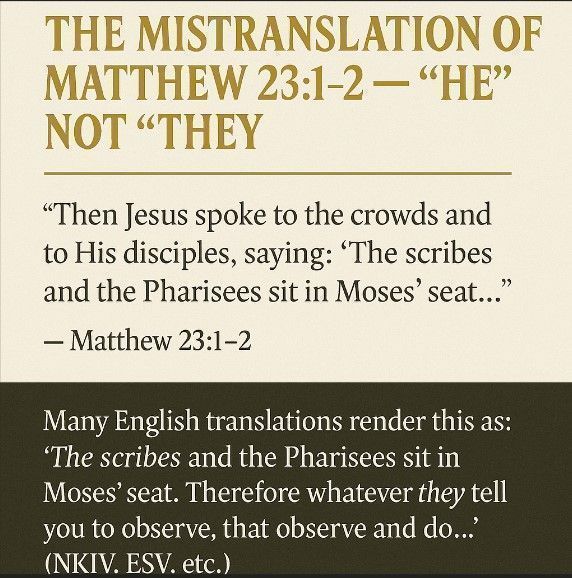“Then Jesus spoke to the crowds and to His disciples, saying: ‘The scribes and the Pharisees sit in Moses’ seat...’”
— Matthew 23:1–2
Many English translations of this passage render the Greek as:
"The scribes and the Pharisees sit in Moses’ seat. Therefore whatever they tell you to observe, that observe and do..." (NKJV, ESV, etc.)
But there’s a critical mistranslation here.
❗What’s the Issue?
The original Greek text does not include the word “they.”
✍️ The Greek Text (Matthew 23:2–3):
ἐπὶ τῆς Μωϋσέως καθέδρας ἐκάθισαν οἱ γραμματεῖς καὶ οἱ Φαρισαῖοι. πάντα οὖν ὅσα ἂν εἴπῃ ὑμῖν, ποιεῖτε καὶ τηρεῖτε...
Notice:
πάντα οὖν ὅσα ἂν εἴπῃ ὑμῖν = “therefore, all that he says to you, do and observe...”
The verb εἴπῃ (eipē) is 3rd person singular — he says, not they say.
🧠 Scholarly Support:
-
George Howard (University of Georgia) in his work "Hebrew Gospel of Matthew" (Mercer University Press):
“The singular verb ‘he says’ in Matthew 23:3 cannot refer to the plural ‘scribes and Pharisees.’ This suggests that it originally referred to Moses himself — and possibly to a reading from the Torah — not to the corrupt teachers who claimed his seat.”
-
Frédéric Godet, Biblical Commentary on the Gospels:
“The verb is singular in the oldest and best manuscripts… the meaning would be: ‘All that he (Moses) says to you…’”
-
James R. Edwards (in The Hebrew Gospel and the Development of the Synoptic Tradition):
“There is evidence from early Hebrew manuscripts that this passage was originally read as referring to Moses and not the Pharisees.”
-
Shem Tob Hebrew Matthew – preserved by Jewish scribes and referenced in Howard's edition — uses the singular “he,” clearly referring to Moses and not the Pharisees.
🕊️ The Real Meaning?
The context of Matthew 23 is Jesus rebuking the scribes and Pharisees for their hypocrisy — so why would He suddenly command obedience to everything they say?
✅ The better understanding is this:
Jesus is telling His disciples to obey Moses — the Torah — not the religious hypocrites who claim to sit in Moses' seat.
🔥 Why This Matters
This subtle mistranslation has led to centuries of confusion, making it seem as though Jesus affirms Pharisaic authority — when in fact, He goes on in this very chapter to condemn them as blind guides and hypocrites.
By restoring the singular subject ("he says"), we return to the message that Christ consistently taught:
Obey Moses — the true words of God — not man-made traditions.
📚 References:
-
Howard, George. The Hebrew Gospel of Matthew. Mercer University Press, 1995.
-
Edwards, James R. The Hebrew Gospel and the Development of the Synoptic Tradition, Eerdmans, 2009.
-
Godet, Frédéric Louis. Biblical Commentary on the Gospels, 19th century.
-
Shem Tov Ibn Shaprut’s Hebrew Matthew (14th c.)
-
Nestle-Aland, Novum Testamentum Graece, 28th ed.
